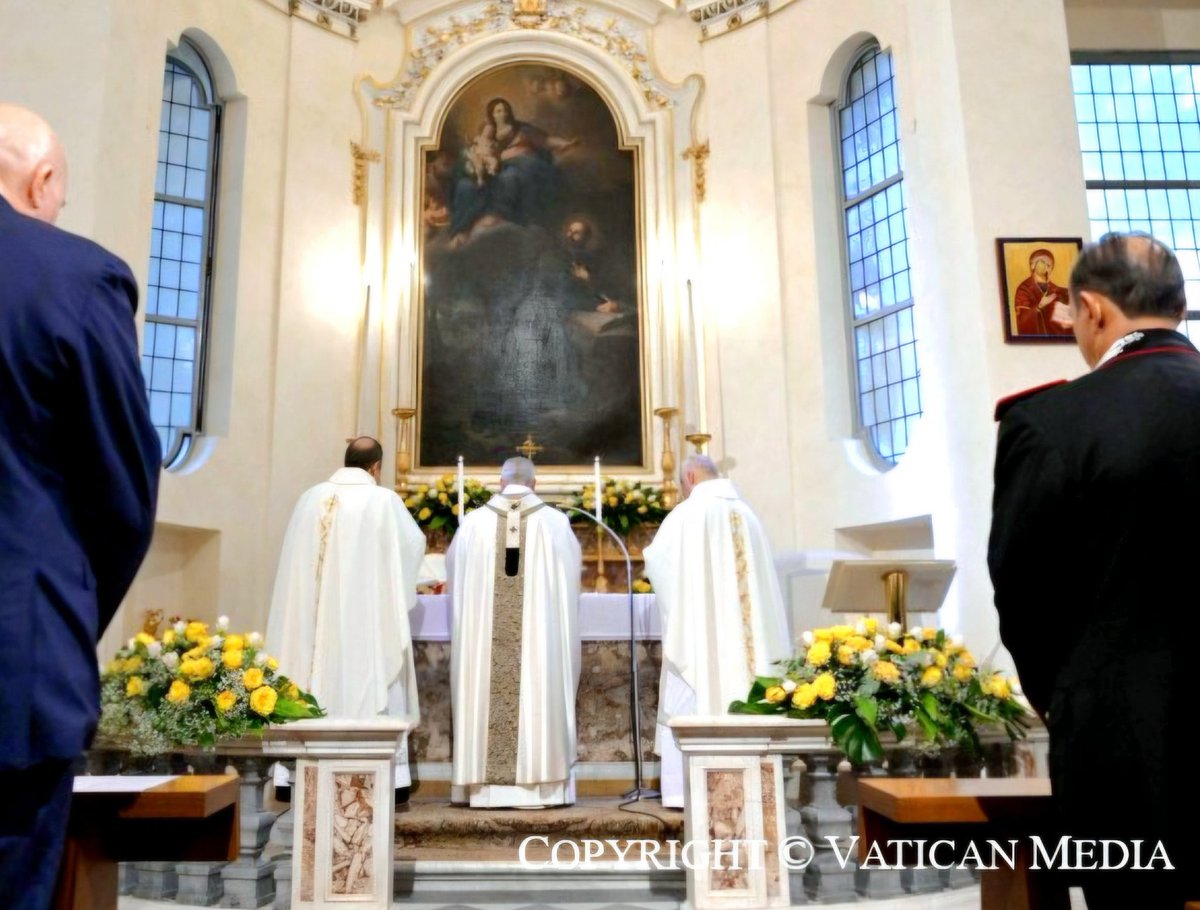Clarity on a much-misunderstood issue…
The Question of Authority:
“Who are YOU to say who is a Heretic?”

It happens all the time when discussing Sedevacantism or related topics, especially with people in the recognize-and-resist camp, like adherents of the Society of St. Pius X or the Fraternity of St. Peter: Whenever the other side is out of arguments, the objection will be made that the sedevacantist has no authority to say what he is saying — for example, to determine who is a heretic, or to say whether a particular theological conclusion is indeed correct — as though it required an act of authority to discern whether a man is a Catholic or a heretic, or as though Catholic teaching were only to be held in theory but never allowed to be applied in practice to a concrete situation.
This tactic is not new, and the great anti-Modernist Fr. Felix Sarda y Salvany refuted it well over 100 years ago in his monumental work Liberalism is a Sin (1886). This book was endorsed and praised by the Vatican’s Sacred Congregation of the Holy Office under Pope Leo XIII. The book exposes the ideas and tactics of the Modernists, called Liberals at the time, and we cannot recommend it highly enough. In fact, one may say that this book completely destroys many fundamental ideas of the bogus Second Vatican Council (1962-65) and the new religion it engendered (which we call the Novus Ordo religion).
It is unfortunate, and perhaps telling, that today we hear the arguments once used by the Modernists, repeated by those who consider themselves traditional Catholics.
The excerpt below is Chapter 32 of Liberalism is a Sin, which specifically addresses the objection that a layman cannot discover heresy on his own, and/or cannot accuse another of being a heretic. Nothing could be further from the truth.
CHAPTER 32: Liberalism and Authority in Particular Cases
How is one to tell on his own authority who or what is Liberal, without having recourse to a definitive decision of the teaching Church? When a good Catholic accuses anyone of Liberalism or attacks and unmasks Liberal sophisms, the accused immediately seeks refuge in a challenge of the accuser’s authority: “And pray, who are you to charge me and my journal with Liberalism? Who made you a master in Israel to declare who is or who is not a good Catholic? And is it from you that I must take out a patent on Catholicity?” Such is the last resort of the tainted Catholic on finding himself pushed to the wall. How then are we to answer this opposition? Upon this point, is the theology of Liberal Catholics sound? That we may accuse any person or writing of Liberalism, is it necessary to have recourse to a special judgment of the Church upon this particular person or this particular writing? By no means.
If this Liberal paradox were true, it would furnish Liberals with a very efficacious weapon with which, practically speaking, to annul all the Church’s condemnations of Liberalism.
The Church alone possesses supreme doctrinal magistery in fact and in right, juris et facti; her sovereign authority is personified in the Pope. To him alone belongs the right of pronouncing the final, decisive and solemn sentence. But this does not exclude other judgments less authoritative but very weighty, which cannot be despised and even ought to bind the Christian conscience. Of this kind are:
1. judgments of the Bishops in their respective dioceses.
2. judgments of pastors in their parishes.
3. judgments of directors of consciences.
4. judgments of theologians consulted by the lay faithful.
These judgments are of course not infallible, but they are entitled to great consideration and ought to be binding in proportion to the authority of those who give them, in the gradation we have mentioned. But it is not against judgments of this character that Liberals hurl the peremptory challenge we wish particularly to consider. There is another factor in this matter that is entitled to respect, and that is:
5. The judgment of simple human reason, duly enlightened.
Yes, human reason, to speak after the manner of theologians, has a theological place in matters of religion. Faith dominates reason, which ought to be subordinated to faith in everything. But it is altogether false to pretend that reason can do nothing, that it has no function at all in matters of faith; it is false to pretend that the inferior light, illumined by God in the human understanding, cannot shine at all because it does not shine as powerfully or as clearly as the superior light. Yes, the faithful are permitted and even commanded to give a reason for their faith, to draw out its consequences, to make applications of it, to deduce parallels and analogies from it. It is thus by use of their reason that the faithful are enabled to suspect and measure the orthodoxy of any new doctrine presented to them, by comparing it with a doctrine already defined. If it be not in accord, they can combat it as bad, and justly stigmatize as bad the book or journal which sustains it. They cannot of course define it ex cathedra, but they can lawfully hold it as perverse and declare it such, warn others against it, raise the cry of alarm and strike the first blow against it. The faithful layman can do all this, and has done it at all times with the applause of the Church. Nor in so doing does he make himself the pastor of the flock, nor even its humblest attendant; he simply serves it as a watchdog who gives the alarm. Opportet allatrare canes “It behooves watchdogs to bark,” very opportunely said a great Spanish Bishop in reference to such occasions.
Is not perchance the part played by human reason so understood by those zealous prelates who on a thousand occasions exhort the faithful to refrain from the reading of bad journals and works, without specially pointing them out? Thus do they show their conviction that reason, this natural criterion, illumined by faith, is sufficient to enable the faithful to apply well-known doctrines to such matters.
Does the Index of Forbidden Books itself give the title of every forbidden book? Do we not find under the rubric of “General Rules of the Index” certain principles according to which good Catholics should guide themselves in forming their judgment upon books not mentioned in the Index, but which each reader is expected to apply at his own discretion? Of what use would be the rule of faith and morals if in every particular case the faithful could not of themselves make the immediate application, or if they were constantly obliged to consult the Pope or the diocesan pastor? Just as the general rule of morality is the law in accordance with which each one squares his own conscience (dictamen practicum — “practical judgment”) in making particular applications of this general rule (subject to correction if erroneous), so the general rule of faith, which is the infallible authority of the Church, is and ought to be in consonance with every particular judgment formed in making concrete applications–subject, of course, to correction and retraction in the event of [a] mistake in so applying it. It would be rendering the superior rule of faith useless, absurd and impossible to require the supreme authority of the Church to make its special and immediate application in every case and upon every occasion which calls it forth.
This would be a species of brutal and satanic Jansenism, like that of the followers of the unhappy Bishop of Ypres, who exacted, for the reception of the Sacraments, such dispositions as would make it impossible for men to profit by that which was plainly intended and instituted for them by Jesus Christ Himself.
The legal rigorism invoked by the Liberalists in matters pertaining to faith is as absurd as the ascetic rigorism once preached at Port Royal [the seat of the Jansenist heresy]; it would result even more disastrously. If you doubt this, look around you. The greatest rigorists on this point are the most hardened sectaries of the Liberal school. But how [to] explain this apparent contradiction? It is easily explained, if we only reflect that nothing could be more convenient for Liberalism than to put this legal muzzle upon the lips and the pens of their most determined adversaries. It would be in truth a great triumph for them, under the pretext that no one except the Pope and the bishops could speak with the least authority, and thus to impose silence upon the lay champions of the Faith, such as were DeMaistre, Cortes, Veuillot, Ward, Lucas and McMaster, who once bore, and others who now bear, the banner of the Faith so boldly and unflinchingly against its most insidious foes.
Liberalism would like to see such crusaders disarmed and would prefer above all to succeed in getting the Church herself to do the disarming.
[Source: http://www.sedevacantist.com/liberalism.htm]; translation from Spanish by Conde B. Pallen; imprimatur 1899; bold print added.]
See Also:
- The Impossibility of Judging or Deposing a True Pope
- Liberalism Is a Sin: The Complete Text Online (Imprimatur, 1899)
- Liberalism is a Sin: Buy a paperback copy of the book
- Important Catholic Quotes against Liberalism and Other Errors
- Auctorem Fidei: Pope Pius VI condemns Ambiguity in Documents, which allows for teaching error with plausible deniability





No Comments
Be the first to start a conversation